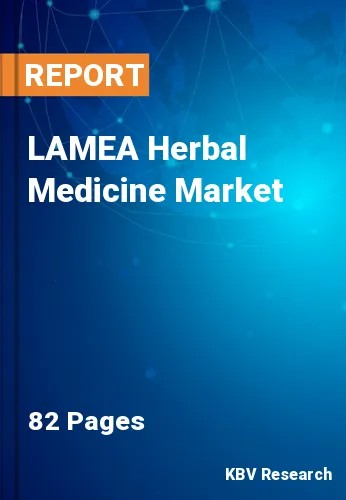The Latin America, Middle East and Africa Herbal Medicine Market would witness market growth of 9.2% CAGR during the forecast period (2023-2030).
The increasing priority on preventive healthcare and overall well-being is a major factor influencing the market. Consumers proactively seek natural solutions to support their health, driving the demand for herbal remedies and supplements. The market is shaped by regulatory frameworks that vary across regions. The establishment of quality standards and adherence to Good Manufacturing Practices (GMP) are critical factors influencing consumer trust and market growth. Striking a balance between traditional practices and regulatory compliance is a key challenge for industry stakeholders.
With the advancement of ethical consumerism, there is a growing emphasis on ecological sustainability and ethical sourcing practices within the market. Customers are increasingly concerned regarding the impact of harvesting practices on biodiversity and the environment, prompting companies to adopt sustainable and responsible sourcing methods. Scientific research validating the efficacy and safety of herbal remedies is essential for gaining wider acceptance in mainstream healthcare. As traditional practices gain recognition and respect, there is a greater likelihood of integration into mainstream healthcare systems. Collaborations between traditional healers, scientists, and healthcare professionals can lead to a more inclusive and complete approach to healthcare.
According to UAE government statistics, the country has 568 food and beverage processors. These factories produce 5.96 million metric tons (MT) of food and beverage goods annually, with 2.3 MT in staple food items. In 2021, imports of bulk and intermediate products were $4.3 billion. Restaurants and food establishments can incorporate herbal ingredients into their menus, providing consumers with culinary experiences highlighting herbs' diverse uses in both savory and sweet dishes. Food and beverage processors can create dedicated product lines focused on health and wellness, incorporating herbal ingredients that align with traditional and modern practices. As a result, these aspects will boost the market growth in the coming years.
The Brazil market dominated the LAMEA Herbal Medicine Market by Country in 2022, and would continue to be a dominant market till 2030; thereby, achieving a market value of $7,767.8 million by 2030. The Argentina market showcasing a CAGR of 9.7% during (2023 - 2030). Additionally, The UAE market would register a CAGR of 8.9% during (2023 - 2030).
Free Valuable Insights: The Worldwide Herbal Medicine Market is Projected to reach USD 342 Billion by 2030, at a CAGR of 7.9%
Based on Application, the market is segmented into Pharmaceutical & Nutraceutical, Personal Care & Beauty Products, and Food & Beverages. Based on Form, the market is segmented into Tablets & Capsules, Liquid & Gel, and Powder. Based on countries, the market is segmented into Brazil, Argentina, UAE, Saudi Arabia, South Africa, Nigeria, and Rest of LAMEA.
By Application
By Form
By Country
Our team of dedicated experts can provide you with attractive expansion opportunities for your business.

